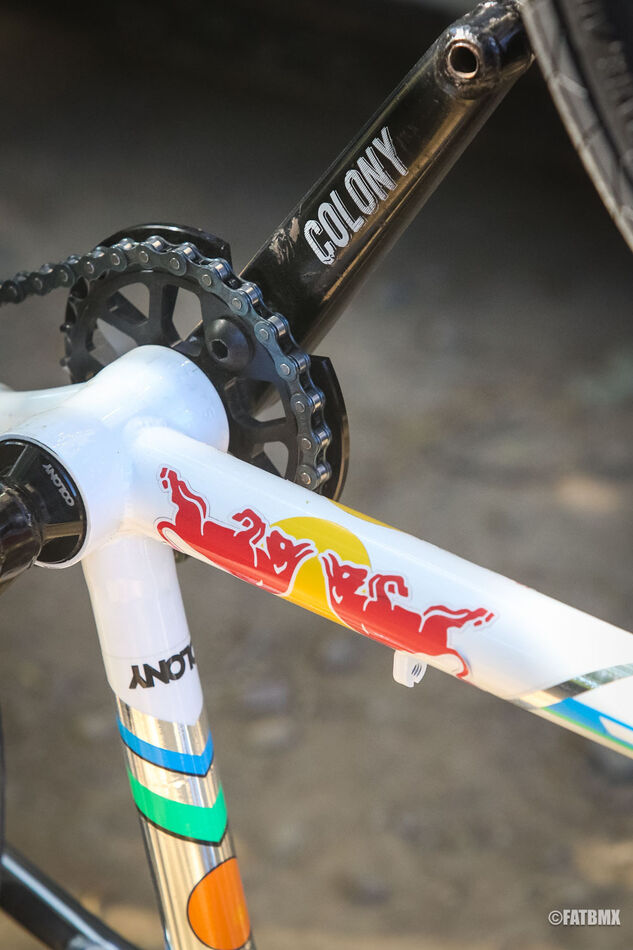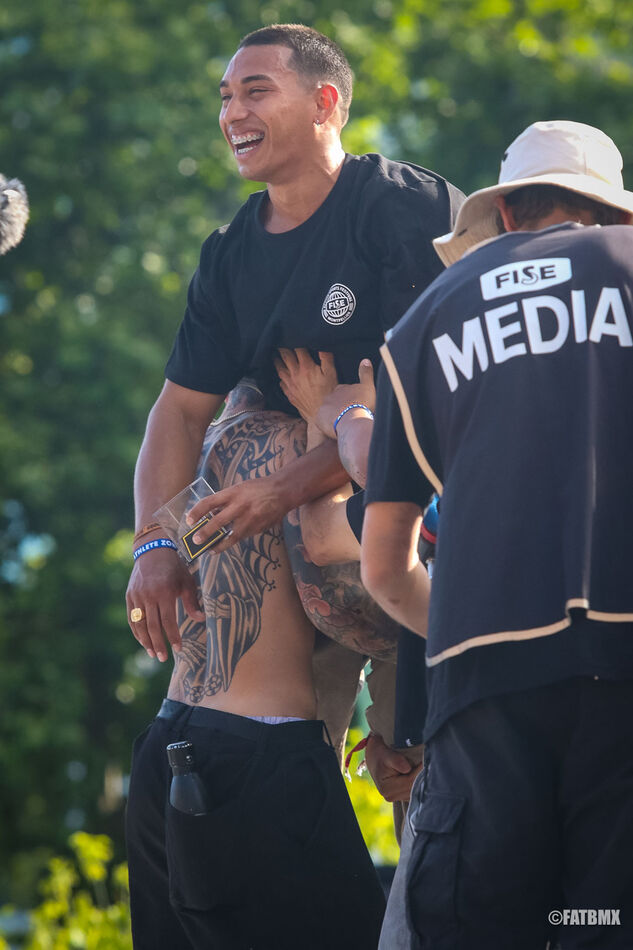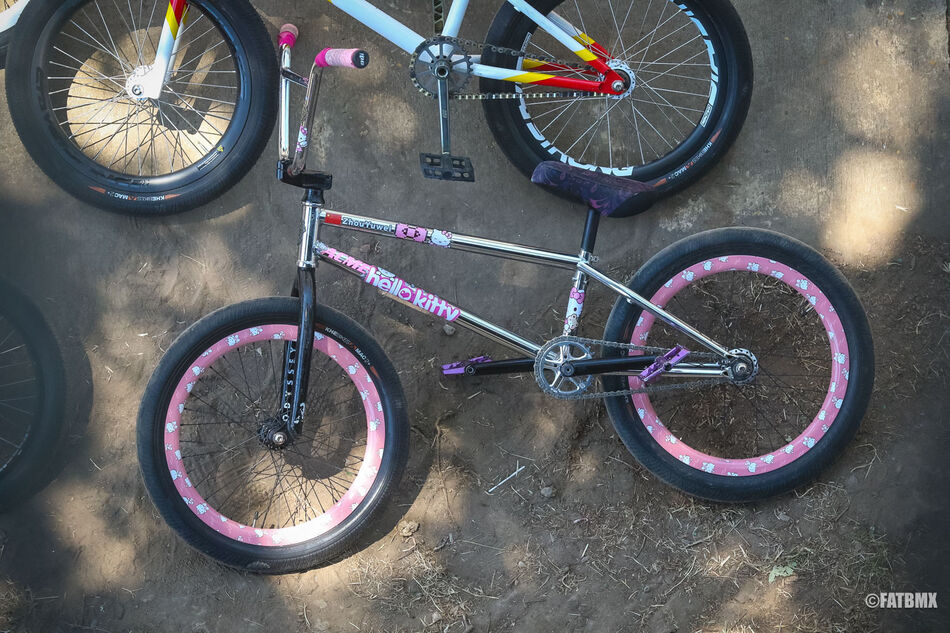 This pattern repeats across generations. Marc and Rich from SourceBMX started as kids at their local BMX track and built what's now considered the world's largest BMX specialist retailer. They didn't go to business school; they learned by doing, expanding from their first website in 2004 to operating warehouses in the UK, USA, and Germany. The company is still "100% Rider Owned and Run" and employs riders who "still work with us to this day."
This pattern repeats across generations. Marc and Rich from SourceBMX started as kids at their local BMX track and built what's now considered the world's largest BMX specialist retailer. They didn't go to business school; they learned by doing, expanding from their first website in 2004 to operating warehouses in the UK, USA, and Germany. The company is still "100% Rider Owned and Run" and employs riders who "still work with us to this day."
Today's generation follows similar paths. Garrett Reynolds, one of the finest BMX street riders in the world, started his own bike company called "Fiend." Mat Hoffman, beyond his riding career, became "an established businessman with Hoffman bikes, selling one of the finest bikes in the industry" and built a net worth of about $18 million through his companies and productions.
The Skills Transfer That Universities Don't Teach
What makes BMX riders surprisingly good entrepreneurs? The sport itself is an intensive business education disguised as fun. Riders learn project management through video production, marketing through social media growth, and product development through understanding what actually works on the streets. They develop problem-solving skills that come from making a $20 part work when you need a $200 solution.
Shad Johnson, who has run Goods BMX in Portland for ten years, represents the shop-owner path. Johnson's success comes from intimately understanding his community. He knows that "Most BMX'ers aren't early risers" and that "If it's summer, I'm at Burnside anyway, getting in a few runs before the shop opens." The Media and Content Creation Revolution
The Media and Content Creation Revolution
BMX has always been ahead of the curve in content creation. Long before "influencer" was a job title, BMX riders were creating video parts, magazines, and photo content that drove product sales and brand awareness. Photography and filming in BMX is described as "a passion and an art" that involves "capturing the true essence of BMX, being there when the big moments go down and fuelling the scene with inspiration."
This early adoption of content creation has positioned many riders perfectly for today's digital economy. They understand storytelling, audience engagement, and authentic brand building in ways that traditional marketing programs struggle to teach. The skills developed in making BMX videos translate directly to running YouTube channels, managing brand social media accounts, or creating marketing campaigns.
Beyond the Obvious: Administrative and Technical Paths
Not every BMX career path involves starting a company or becoming a content creator. Bernard Anderson, CEO of USA BMX, started racing at age 6 and built a career in sports administration. His organization "has more than 70,000 members and oversees 380 race tracks in North America". Anderson didn't just stay passionate about riding; he channeled that passion into building the infrastructure that supports the sport.
Current job listings show BMX-related positions ranging from athletics coordinators and sports instructors to mechanics and event organizers. These roles require BMX knowledge and community understanding that can't be taught in a classroom.
The Sponsorship-to-Business Pipeline
Professional sponsorship often serves as an informal business education. According to industry insiders, getting sponsored requires more than riding skills: "You have to bring something different to the table" and "being a great rider is important, but maybe more important is being a good person." Sponsored riders learn about contract negotiation, brand representation, social media strategy, and customer relations. Many riders use sponsorship as a stepping stone to bigger things. Dave Mirra leveraged his riding success into hosting MTV shows, appearing in video games, and eventually starting his own bike company, MirraCo, in 2007. The business skills developed through managing sponsorship relationships translate directly to running companies.
Many riders use sponsorship as a stepping stone to bigger things. Dave Mirra leveraged his riding success into hosting MTV shows, appearing in video games, and eventually starting his own bike company, MirraCo, in 2007. The business skills developed through managing sponsorship relationships translate directly to running companies.
The Reality Check: It's Not Easy
Let's be honest about the challenges. Running a BMX shop means "non-stop work hours" that start "way before and last long after normal business hours," dealing with an "almost incessant barrage of vacuous questions daily" and regular stress from business management. The failure rate for BMX businesses is probably higher than the already brutal small business average.
Industry professionals note that "being a pro rider can be wonderful, every day's a Saturday! But I've seen riders fall off too" and that some riders are "happier when they ride for themselves and on their terms." The transition from personal passion to business responsibility isn't always smooth. The Skills That Actually Matter
The Skills That Actually Matter
What BMX teaches that business school doesn't: authentic community building, lean operation methods, creative problem-solving under resource constraints, and the ability to identify genuine market needs versus manufactured demand. BMX riders learn to read people, understand subcultures, and build trust through actions rather than presentations.
These aren't soft skills, they're the exact capabilities needed in today's entrepreneurial economy. The ability to spot trends early, build authentic relationships, and operate efficiently with limited resources gives BMX-bred entrepreneurs significant advantages over traditionally educated competitors.
The Future is Already Here
SourceBMX's evolution from local track kids to global operation demonstrates what's possible. They've maintained their rider-first culture while scaling internationally, proving that BMX values and business success aren't mutually exclusive.
The unconventional career path isn't just viable, it might be superior. While traditional business education teaches theory, BMX teaches application. While universities create networking opportunities, BMX creates genuine community bonds. While business school teaches risk management, BMX teaches how to get back up when things go wrong.
For young riders looking at career options, the message is clear: your passion isn't separate from your professional future. The skills you're developing, the community you're building, and the problems you're solving all have commercial applications. The question isn't whether you can build a career around BMX, it's whether you're willing to put in the work to make it happen.
The BMX industry doesn't need more people with traditional qualifications. It needs more people who understand the culture, respect the community, and can solve real problems. If you're already riding, you're already in training for a career path that doesn't exist in any course catalog, and that might be exactly what makes it so valuable.
The Unconventional Career Path: How BMX Riders Break Into the Industry
 Forget everything you think you know about traditional career paths. In the BMX world, there's no college major called "Professional BMX Business Management," and you won't find a "BMX Industry Studies" degree at your local university. Yet somehow, passionate riders continue to transform their love for two wheels into thriving careers that span everything from bike manufacturing to media empires. The path isn't conventional, but it's real, and it's happening right now. The beauty of BMX career paths lies in their organic nature. Unlike corporate climbs or academic trajectories, BMX careers often start in bedrooms, garages, and local bike shops. Young riders who can't afford to find someone professional, like a paper writer for their college essays, are instead learning real-world business skills by managing their own Instagram accounts, negotiating sponsorship deals, and understanding supply chains through their desperate need for affordable parts. These aren't theoretical lessons; they're survival skills in a community where creativity and hustle matter more than credentials.
Forget everything you think you know about traditional career paths. In the BMX world, there's no college major called "Professional BMX Business Management," and you won't find a "BMX Industry Studies" degree at your local university. Yet somehow, passionate riders continue to transform their love for two wheels into thriving careers that span everything from bike manufacturing to media empires. The path isn't conventional, but it's real, and it's happening right now. The beauty of BMX career paths lies in their organic nature. Unlike corporate climbs or academic trajectories, BMX careers often start in bedrooms, garages, and local bike shops. Young riders who can't afford to find someone professional, like a paper writer for their college essays, are instead learning real-world business skills by managing their own Instagram accounts, negotiating sponsorship deals, and understanding supply chains through their desperate need for affordable parts. These aren't theoretical lessons; they're survival skills in a community where creativity and hustle matter more than credentials.
The New School Entrepreneurs
Take Scot Breithaupt, who founded SE Racing in 1977 and turned it into a major BMX brand. Breithaupt didn't start with a business plan or venture capital; he started with stickers, t-shirts, and an understanding of what riders actually wanted. His company grew from a small advertising and promotional operation into a full-scale bike manufacturer because he was embedded in the community he served.
Related items
- TEXAS TAKES OVER CAMP WOODWARD - Wild Group Of BMX Riders! JR Hobbs
- HURRICANE GROUP UNVEILS STRATEGIC VISION FOR 2026–2032
- What BMX Riders and Horse Racing Jockeys Have in Common
- CASIO G-SHOCK JOINS USA BMX AS NATIONAL SPONSOR FOR 2025 PRO SERIES
- TRAFFIC Takes Over Distribution of SE BIKES in Europe & the UK




 After doing a BMX 'zine for ten years (1987 - 1996) FATBMX made it on the internet. The year was 1998. Here to stay.
After doing a BMX 'zine for ten years (1987 - 1996) FATBMX made it on the internet. The year was 1998. Here to stay.